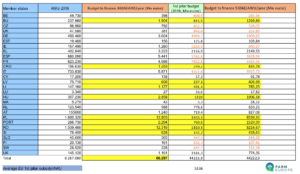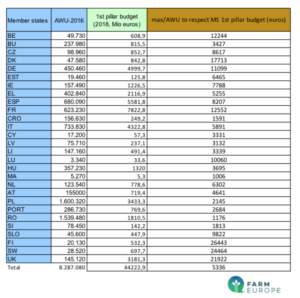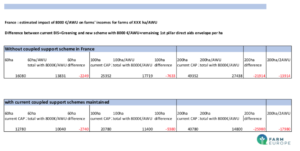In a nutshell:
-CAP Reform Package
—> The Presidency recalled that delegations to the Council in July were mostly in favor of an increased environmental and climate ambition, accompanied by sufficient funding, a reduced administrative burden for all and a sufficiently flexible agricultural policy to take into account the specificities of MS.
The Presidency therefore proposes to continue to build the green architecture of the new CAP with a view to an increased environmental and climate ambition, a common percentage or fixed amount per MS. Funding for ecological programs could be strengthened by specific amounts or percentages for MS to organize by allocating interventions among pillars.
The presidency also stressed the contribution to the climate and the environment of the CAP, as well as the commonality of this policy.
—> The majority of MS expressed their support for the principle of a single common share for environmental and climate measures on both pillars proposed by the Council Presidency. However, they added that there were still a lot of technical details to be clarified, and especially that it would be arbitrary and premature to fix now a specific part and amounts. This is mainly due to the state of play of the negotiations on the CAP budget in the next MFF, but also the work remaining to be done on the list of measures to be included in this device proposed by the Presidency.
On this second aspect, the MSs overwhelmingly proposed measures to be added to the proposed list, such as basic income support, or all or part of the aid for areas subject to natural constraints.
While the treatment of small farms as part of the cross-compliance controls and the mandatory or non-mandatory nature of the eco schemes continue to divide the delegations, most of them have expressed their support for the increased level of climate and environmental ambition within the CAP. To this wish, many delegations also associated that of financial resources with this objective, by maintaining the budget of the CAP at the level of that of the EU at 27 and at current prices.
—> Latvia presented a joint statement with Poland, Estonia and Lithuania to include liming of acid soils in the list of measures.
-Regulations on CAP transitional rules
—> – The Finnish Presidency aims to have the first proposal on flexibility be adopted by the fast-track producer. So far indications have shown that this adoption without amendment should be possible – EP shares this point of view
– The second one – a more substantial – lays down transitional provisions for the year 2021 and it amends all 4 basic acts plus the Regulation on agriculture in the outermost regions. This one needs more discussion in Council and EP, co-legislators aim adoption for mid-2020
—> While several delegations favored an extension of the transition period, considering that one year would be too short, other delegations called for not postponing the implementation of the new CAP beyond 2022. Several delegations also supported the joint statement submitted by Bulgaria.
—> Bulgaria presented a joint statement with CY, CZ, PO, RO to include the possibility to apply the transitional national support under Art 37 Regulation 1307/2013 at financial levels not lower than those of 2020
—> In concludings remarks, Commissioner Hogan said that: “we could remove many of the concerns if we can get agreement on MFF and CAP reform in 2020. Transitional national aids regulation was introduced may years ago before the last reform with a phasing out schedule at the end of 2020 therefore it is consistent with the agreement made in 2013 hence not in the COM proposal. In relation to 3,9% POSEI reduction, there is no problem from EC’s point of view if this money is reinstalled. On the possibility to use the rural programs of 2014-2020 in the context of these transitional regulations and those the n+3 continue to apply, the commissioner replied that the n+3 rule continues to apply, MS extending the rural development programs will be able to continue to implement them up to the 31st of December 2024. Technical level will be able to continue the work, but would strongly advise that both of the transitional regulations are speedily implemented otherwise MS will run the risk of some financial programs and risks in rural development programs in 2021”.
—> Indicative dates : next next planned Agri-Fish Council on December, 16&17, Brussels
full version of the Council report available on FE members area


